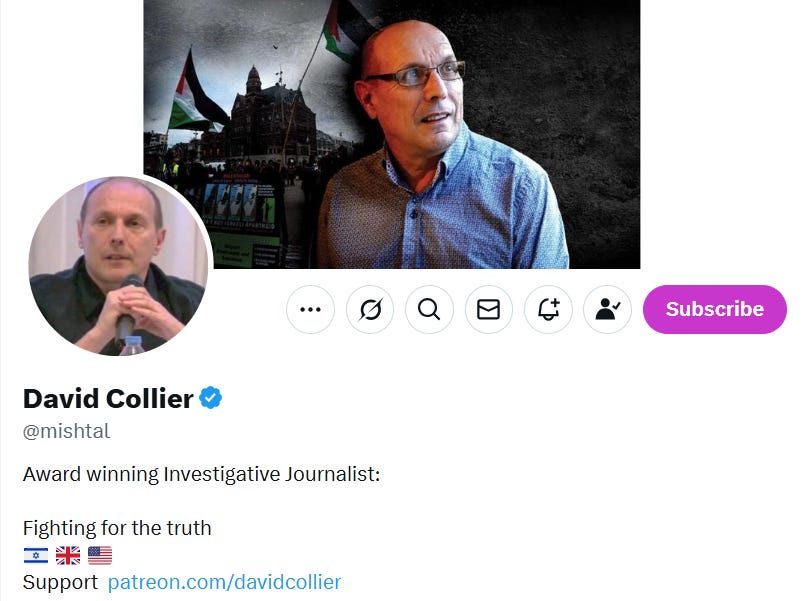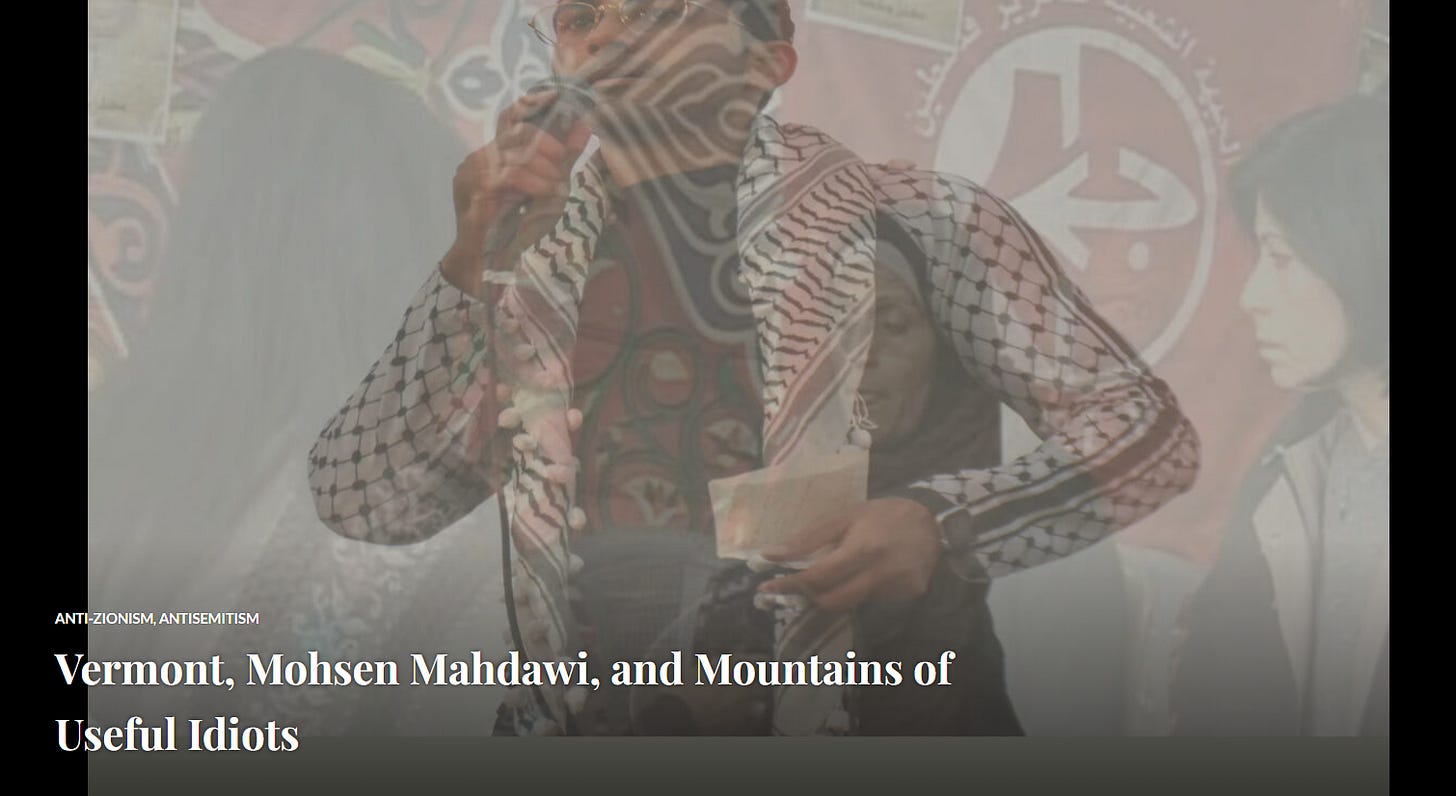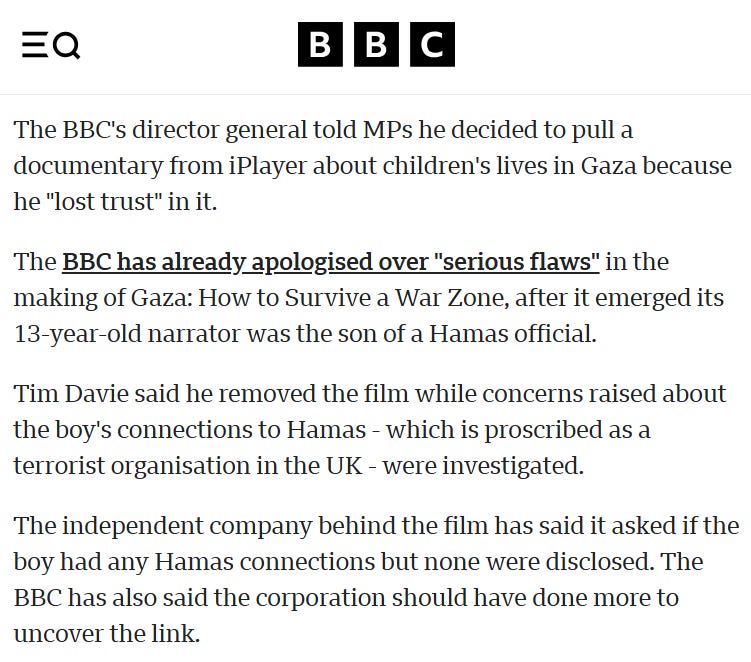Exclusive Interview: David Collier on Journalism's Collapse and the Fight for Truth
After exposing the Mohsen Mahdawi scandal and his ground-shifting BBC investigation, David Collier speaks about media bias, antisemitism, and why investigative reporting is more vital than ever
In an era of breaking news chaos, hyper-polarized narratives, and historic lows in media trust, genuine investigative journalism often feels like an endangered species. Few embody the spirit of tireless, fact-driven investigations better than David Collier, who has spent years documenting antisemitism, extremism, and systematic media failures in places most others overlook.
Collier's March 2025 exposé on the BBC's documentary Gaza: How to Survive a Warzone revealed that the film's narrator, a 13-year-old boy, is the son of a senior Hamas official—a fact the BBC failed to disclose. Collier also found that other children featured in the documentary had familial ties to Hamas, and that the film's subtitles mistranslated or omitted terms like "Jews" and "jihad," replacing them with "Israelis" and "resistance," respectively. These revelations caused an uproar in the United Kingdom and globally, led to the documentary's removal from streaming platforms, and ignited widespread criticism of the broadcaster's editorial standards.

After his recent exposé on Columbia University student Mohsen Mahdawi—which revealed troubling facts about the alleged “peace advocate” that were ignored by legacy media outlets—Jewish Onliner reached out to Collier with a series of questions about his investigation, the state of journalism today, and the personal toll he has experienced by exposing uncomfortable yet necessary truths.
We are publishing the interview here, edited for length and clarity:
Jewish Onliner (JO): You’ve spent years documenting the quiet undercurrents of antisemitism, extremism, and media bias - often in spaces where others aren’t looking.
In an age of social media saturation, AI-generated content, and polarized newsrooms, why do you believe the role of the investigative journalist still matters?
David Collier: I believe the role of the investigative journalist still matters because we do things others simply cannot. AI-generated content doesn't come into play when it comes to understanding what’s happening on social media. The role of someone like me—who goes beyond the noise and digs beneath the narrative being presented—is more important than ever. Rather than being replaced, I believe there should actually be more investigative journalists out there doing this work.
JO: Your investigation into Mohsen Mahdawi paints a far more complicated picture than the one embraced by many in the media and political class.
Why do you think so many were quick to accept and promote the sanitized narrative? Is this just a symptom of pro-Palestinian bias, or is something deeper at play - perhaps ideological, psychological, or even generational?
David Collier: The issue with someone like Mohsen Mahdawi is complex. There are several reasons why people are so quick to accept and promote the sanitized narrative.
Firstly, there's the pro-Palestinian bias—obviously. Secondly, we live in a very lazy age. Most people have an attention span of about 280 characters, if that, or just one swipe of an image on Instagram. So actually countering the Palestinian narrative becomes a problem. They get to hold up an image of a dead baby—and that’s it. The message is loud and clear.
But for those of us on the other side, we have to provide context. We have to explain why that baby is dead. And that explanation takes far more than 280 characters.
Thirdly, there's reverse racism—the racism of low expectations. Palestinians are seen as having no agency. They can do no wrong. They’re the victims—every single time. But yeah, at the core of it, it’s mostly about antisemitism and anti-Israel bias.
Mahdawi can stand up and say whatever he likes. And the lies he’s pushed—nobody, not once, not ever, bothered to check them. Not a single mainstream media outlet said, “Hang on a minute, should we verify this story?”
And you know what? His basic claim—the one where he said he saw his best friend, a child, killed when he was 10—took about four minutes to disprove. Four minutes to prove it was a lie. And that’s a disgrace.

JO: You revealed that Mahdawi managed social media groups glorifying terrorism and had close family ties to known militants - facts that one would imagine can be identified by experienced journalists at mainstream outlets.
Why do you think none of the journalists or institutions who championed his case uncovered - or reported - this?
David Collier: I think journalists today are inherently lazy. And I think that laziness is a symptom of what's happening in wider society. At the end of the day, journalists are just human beings doing a job.
The fact that not one of them bothered to do the research tells me that no one is actually doing the job of a journalist anymore. What they’re doing instead is looking for shortcuts. They’ll scroll through social media, find someone’s tweet, write a quick article about it—or just copy someone else’s work.
Take this man, Mahdawi—he was arrested. The instinct of a real journalist should have been: “I need to know the truth. Why was he arrested? Is there something in his past that explains this?” But not a single journalist asked that question.
It’s an absolute disgrace. Why didn’t they do it?
A. Laziness.
B. Anti-Israel bias.
C. Antisemitism.
JO: Much like in the Mahdawi case, your exposé of the BBC’s “Gaza: How to Survive a Warzone” revealed glaring editorial failures - from mistranslations to misleading omissions.
Why do you think this particular exposé resonated so widely with the public, even more than some of your previous investigations?
David Collier: We've obviously had exposés against the BBC before. I was looking at the BBC precisely for that reason. In this particular case, there were several factors. The catastrophic failure of the BBC here was over and above everything we'd found before.
We'd previously found them quoting someone they shouldn't have, relying on a journalist they shouldn't have used, pushing fake news, writing badly worded headlines, publishing biased articles—all of those kinds of things. And all of that depends on an editor, or a journalist, or a mistake that was made somewhere.
There is an information supply chain that comes out of Gaza—and everything that comes out of Gaza comes from Hamas. If Hamas wants it out, it gets out. If Hamas doesn't want it out, it doesn't get out. The catastrophic failure here was that, at every point along that supply chain, nobody did their job—all the way up to the top executives at the BBC. Every single part of the chain failed. That’s why it was inexcusable. That’s why they had no choice but to take it down. They couldn’t just give some kind of apology and be done with it.
And the other issue, of course, is that we’re dealing with publicly funded money that was handed to the family of a Hamas terrorist. That creates a legal issue. It was a combination of those factors—and the fact that we caught them in an error so catastrophic that their usual excuses just wouldn’t work—that left them with no choice. Taking down the documentary was an exceptional move for them, and that’s another reason it got so much attention.
JO: The BBC eventually pulled the documentary and issued an apology.
In your view, was this a genuine moment of institutional accountability - or more of a reputational containment move? Has anything changed at the structural level?
David Collier: We still have to see how this plays out. The BBC was forced to take the documentary down fairly quickly, though they waffled through the first two or three days. But the moment I saw what I’d found, I knew—they were going to have to pull it. They had no choice.
The fundamental question was this: if the BBC didn’t know that the narrator was the son of a Hamas minister, what else didn’t they know? There was no way the documentary could stay up.
As for the apology—it’s too early to judge. They apologized because they claimed not to know who the narrator was. But we’re still waiting to see what follows.
So yes, the first move was reputational containment. Has anything changed at a structural level? Too early to tell. We’ll have to see how much responsibility the BBC actually takes.
My gut feeling? They’ll waffle. Maybe we’ll see a scapegoat or two. But whatever the BBC ends up saying—it won’t be enough. And no, I don’t think there will be any meaningful structural change.
What we need is exactly that—real structural reform. So now we wait for them to release their investigation findings. They’ll probably issue a half-hearted statement. Then, the real task begins: pushing the conversation forward and holding them accountable.

JO: One of the recurring patterns in your work is the persistence of journalistic malpractice - misreporting, omission, ideological filtering.
Yet the same errors seem to reappear, again and again. Does that ever dishearten you? Or has it only sharpened your sense of purpose?
David Collier: Journalistic malpractice is everywhere. I’ve completely lost faith in journalism as a whole. I genuinely believe there are very, very few real journalists left.
Most people today—especially in the age of social media—have become lazy. They’ve turned themselves into brands. They’ve become activists simply by opening online accounts. Now, they’re Twitter activists. And that activism shapes what they do. It becomes more about their personal ideology and public persona than about facts.
Disheartened? No. I’m fully aware of the fight we’re in. I know exactly how bad the situation is. There’s no moment of despair. In fact, I’m happier with myself than I’ve been in a long time—because I know I have purpose. I know I’m doing the right thing. It doesn’t matter how many people disagree with me, threaten me, or insult me. I get death threats daily. None of that matters.
I know I’m doing the right thing. Journalism, as it once was, is gone. But I feel I’m doing a job that still needs to be done.
JO: Much of your work involves uncovering facts that challenge widely accepted narratives - often at the risk of backlash or being labeled controversial.
How do you navigate the tension between telling uncomfortable truths and staying within the bounds of what’s socially or politically acceptable? And what kind of personal or professional cost comes with that?
David Collier: There’s an Overton window—we’re only allowed to say certain things. And I believe Europe is in serious trouble. If the UK doesn’t change course, we’re a generation—maybe a little more—away from seeing our own intifada in the streets.
These are hard messages to share, because they aren’t socially or politically acceptable. The moment I say them, I get branded as some kind of racist. But I say them anyway. I’m not hiding anything.
That said, when I write articles aimed at reaching the mainstream, there’s no point in constantly pushing boundaries just for the sake of it. The goal is to reach people. If I alienate my audience, I fail at that. So I avoid self-sabotage for strategic reasons, not because I’m afraid to speak plainly.
When I give talks, I speak directly. I tell people exactly what I think.
As for personal and professional cost—I have to watch my back. I’ve been assaulted twice. I get death threats every day. The abuse? I don’t care about it. It’s irrelevant to me.
But my children can’t identify themselves as my children. I can’t talk about them publicly. I’ve had to take steps to protect my immediate family. There are plenty of people who hate me. It is what it is.
I’m just doing a job that needs to be done. I won’t stop just because someone threatens me.
Look at my children: one joined the army as a lone soldier. The other went to university at 18. Israelis don’t have that luxury of choice. At 18, they send their kids to Gaza to face Hamas and Islamic Jihad.
So for me to sit in London and worry that maybe someone’s going to punch me? That’s entitled. It’s irrelevant.

JO: Looking ahead, where do you see the greatest threats - and the greatest opportunities - for truth-telling in journalism?
And how can readers better equip themselves to spot bias, distortion, or manipulation in the content they consume?
David Collier: I don’t actually see many opportunities for truth-telling in journalism right now. I think we’re in danger. The threats are growing—because journalism is getting worse. One of the fundamental problems is that journalism today has become a reflection of society as a whole.
As the Islamist community grows in London and across the UK, so does its presence within media institutions. If the BBC, ITV, or Sky News have spent the past two decades hiring people from outlets like Al Jazeera—well, how many do you need before your newsroom starts to resemble Al Jazeera?
Mainstream media is in serious trouble. I wouldn’t trust any of it. I’ve seen how it’s made. I’ve dismantled their arguments. It’s not worth reading or watching.
So, how can readers better equip themselves to spot bias, distortion, or manipulation? First off—if it’s in the mainstream, it’s probably not true.
Where to start? Ask a basic question: how does the journalist report on the United Nations? The UN is the sum of its parts—Russia, China, Libya, Pakistan, Bangladesh, Cuba, Congo, and so on.
If a journalist quotes the UN, Amnesty International, or the UN Human Rights Council as if they are credible, respected institutions—that journalist should not have a job.
That’s how I judge it. It’s not about the fine details—because once you’re arguing about those, you’ve already lost.
It comes down to this: does the journalist have integrity or not? If they’re quoting the UN as if its numbers or statements carry unquestionable weight, that tells you everything you need to know. That’s what I think really matters.



